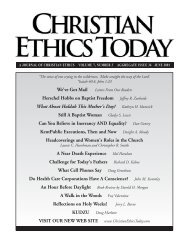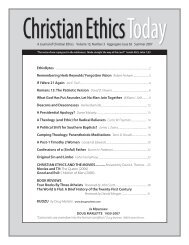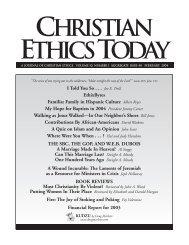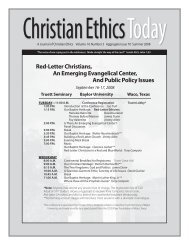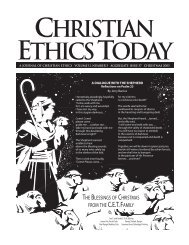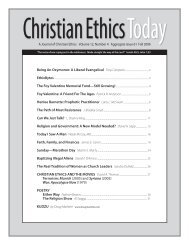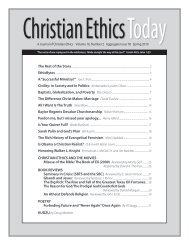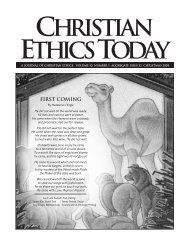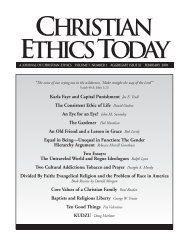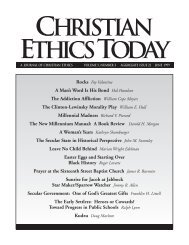Issue 033 PDF Version - Christian Ethics Today
Issue 033 PDF Version - Christian Ethics Today
Issue 033 PDF Version - Christian Ethics Today
Create successful ePaper yourself
Turn your PDF publications into a flip-book with our unique Google optimized e-Paper software.
Perspective<br />
Three decades past I skipped along beside<br />
Her. Soul tired—I carried grain and grumbled.<br />
How tall she looked! How large the fields! Her stride<br />
Was smooth. Attempting to keep pace, I stumbled.<br />
She sat the grain where all the grass seemed dead,<br />
And ran her fingers through my tangled thatch.<br />
“Some day the fields will seem so small,” she said.<br />
“When you’ve grown large, the fields will be no match.”<br />
The fields are very big,” I said. “You’ll see!”<br />
She grinned and kissed my immaturity.<br />
Our shadows were El Greco-esque as we<br />
Trudged across the endless earthen sea.<br />
She sleeps beneath those fields where she stood tall.<br />
And I, at last, can see the fields are small.<br />
She was some twenty years before you. She was there when<br />
my father left—when the bombs shattered the balmy air above<br />
faraway Hawaii. With her covey of little ones and no means of<br />
support except her two good hands, her strong intention was to<br />
serve. She vowed that her life would give life to her brood of<br />
nine.<br />
I don’t know that she was brave, but I remember her as fearless.<br />
I believe she saw fear as an unnecessary tremulous contagion.<br />
Fear was always contracted in dread and spread by those<br />
who volunteered to quake. If she was afraid, I never knew it. In<br />
her confident presence, I grew up braver that I might have been.<br />
I never knew I was poor, either. From time to time, there are<br />
those who do spin straw into gold. She was one of those who<br />
could create a sense of strong abundance from the thinnest<br />
poverty.<br />
The house my father left to us was unfinished. However, not<br />
knowing what a finished house looked like, I was not aware of its<br />
uncompleted state. I could tell it was small—three rooms and no<br />
indoor plumbing. We burned wood when the Oklahoma winter<br />
was short, and coal when it was not.<br />
My mother was such a pragmatist that none of us ever<br />
viewed her as a miracle worker. Wood ranges were supposed to<br />
yield hot berry pies and overflow with yeasty loaves of bread. For<br />
countless winters I stood before that iron icon and learned that<br />
abundance is never what we have but what we suppose we have.<br />
I was rich because my mother seemed rich and I never saw the<br />
actual poverty of those days.<br />
12 • APRIL 2001 • CHRISTIAN ETHICS TODAY<br />
The First First-Lady<br />
By Calvin Miller, Professor of Preaching<br />
Beeson Divinity School, Birmingham, Alabama<br />
Editor’s Note: Addressed to his wife, Calvin Miller’s inspiring tribute to his mother is published by permission from his autobiographical<br />
work, A Covenant for all Seasons: Wheaton, Harold Shaw Publishers, 1984.<br />
At Christmas, she would read Dickens’s Christmas stories by<br />
the light of a kerosene lamp—which we called a “coal-oil” lamp.<br />
With never so much as a goose of our own for Christmas dinner,<br />
we all felt sorry for the Cratchits. In the midst of a life that others<br />
viewed as desperate and hard, my mother’s inner wealth was<br />
spirit so abundant that it fostered and made real a luxuriant<br />
deception: I too was rich.<br />
Still, thrift is the kinsman to wealth. Nothing was to be<br />
thrown away. I only later saw the wonderful wealth she demonstrated.<br />
Life was an economy! Subtle were her greatest lessons.<br />
She gave dignity to thrift. She taught all her children to feel pride<br />
in constructing the indispensable from things others threw away.<br />
A rummage sale bristled with opportunities to keep the winter<br />
warm. Secondhand clothes were not vile items cast away by others.<br />
Hand-me-downs from my two older brothers were an opportunity<br />
to wear things that had already twice proven themselves<br />
worthy. There were wonderful things all about us that, in their<br />
simplicity, were usable, and left us no need to frequent pretentious<br />
shops. Those stores were for people with limited ingenuity.<br />
She also taught us that we were only managers of heaven’s<br />
gifts. The Lord provided everything. Our daily bread had come<br />
from Him, my mother said, and like manna, it lay on the<br />
ground to be taken fresh every morning.<br />
Our house backed up to “the tracks.” The great locomotives<br />
ran only an alley away from our rough-weathered dwelling. The<br />
tracks were the parallel footprints of the mammoth dragons that<br />
stalked the land in which I lived. The trains came day and night,<br />
and left me dreaming by the steel rails. I much romanticized the<br />
great locomotives. Enraptured, I waved at the engineers who<br />
rode the iron dragons like powerful warlords on armored beasts.<br />
I think she knew how my reveries constructed dragons from<br />
these “puffer-bellies” that drew strings of namby-pamby cars<br />
along the silver strands. Some said the tracks went all the way to<br />
St. Louis and ended in Los Angeles, but neither of these suppositions<br />
intrigued me. The rails held a mysterious enchantment of<br />
their own. The tracks were real; so were the steel dragons. So real<br />
that their heavy iron wheels would flatten pennies to the size of<br />
silver dollars. Those same iron wheels sent earthquakes up and<br />
down the line as the grumbling steam rattled every window in<br />
our tiny house.<br />
But the tracks were not dreaming places to her. While I celebrated<br />
their intrigue, she celebrated their gravel beds in which<br />
the cross ties, splintered by the spikes, held more than rails. The<br />
old wooden cars jolted and banged around during harvest. They



